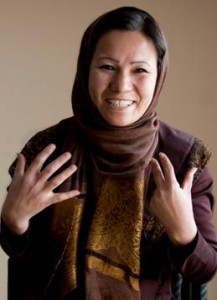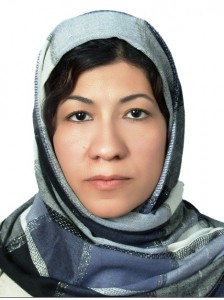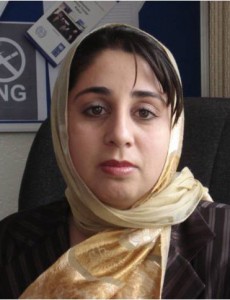Student feature: Sakina Ibrahimi
April 28th, 2010Sakina Ibrahimi, 2010 PEACE THROUGH BUSINESS Leadership Development delegate, stays busy as a wife, mother, business owner … and a women’s rights activist in Afghanistan.
Married at 17 and a mother at 19, Ibrahimi says she faced some struggles growing up with the rules of the Taliban while living in Iran. Because of harsher rules dictated that she not be allowed to work outside the home, Ibrahimi and her family decided to move back home to Afghanistan once it was safe.
But even though Afghanistan was peaceful, her problems with women’s rights persisted, so Ibrahimi decided to join forces with other women to fight unjust rules.
They made the decision to protest the Shea Law, which among other things, allowed Afghan men to deny their wives food if the wives refused to follow their rules.
She and 16 other Afghan women met and organized a public demonstration; Ibrahimi says speaking out against the law opened her eyes to the impact women could make.
“In the past, women haven’t had any impact on public policy or social activity,” she says. “But after having this protest, I was awed. I realized can be independent and can have everything men have.
“Now, we must change the minds of men.”
Unlike many women with whom she worked, Ibrahimi’s husband supported her getting involved in public policy.
“We are like friends,” she says. “He told me he thought it was important for me to do what was important to me.
“He didn’t have a problem when I came home late or when I wasn’t always available for my children because he knew it was important for me to be involved.”
Ibrahimi has a lot of things that keep her busy. She is the owner of Namad in Dari, a company that manufactures wool products, including rugs and shoes. Her part of Afghanistan is known for its wool products, and Ibrahimi has capitalized on this asset.
Ibrahimi says it is important to her to work outside the home and to have a successful business.
She says she has loved what she has learned from western women in the PEACE THROUGH BUSINESS program, and she is looking forward to learning more.
“They have given us a lot of information, and given their skills and support,” Ibrahimi says.
She also says she would like to have more opportunities to connect with women in the West.
“It’s important that we’re there in every situation, not just for a month or so,” she explains. “We need to follow upon what we’re doing and what’s going on with our business. Support should be long term.”
Women’s rights have always been a passion for Ibrahimi, but she continues to stress the importance.
“I think a woman should do everything she can for herself. They have to confirm that they can be independent.”
A special thanks goes out to Peggy Kelsey for interviewing and photographing Sakina.







